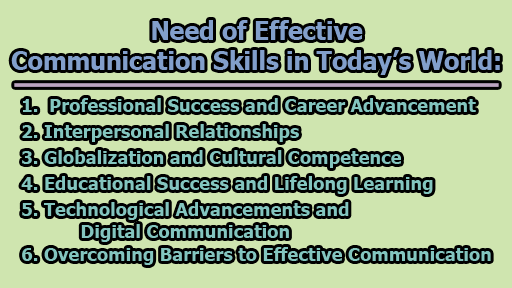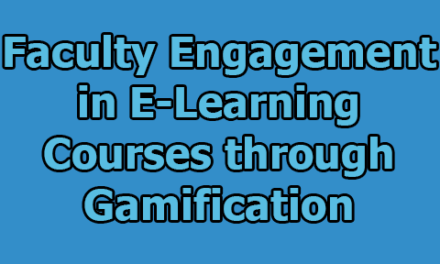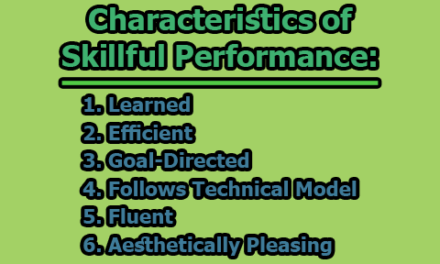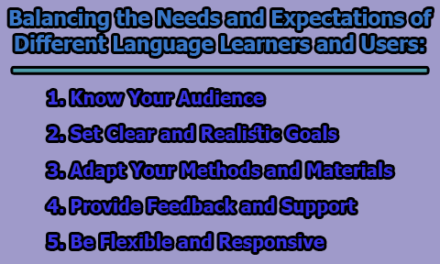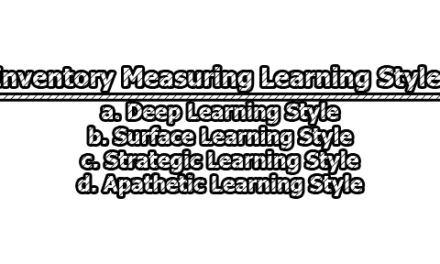Need of Effective Communication Skills in Today’s World:
Communication is the cornerstone of human interaction, a dynamic force that shapes relationships, drives progress, and fosters understanding. In today’s fast-paced and interconnected world, the importance of effective communication skills cannot be overstated. From personal relationships to professional success, the ability to convey thoughts, ideas, and emotions with clarity and impact is a critical asset. This article delves into the multifaceted need of effective communication skills in today’s world, exploring their role in various aspects of life and the evolving landscape of communication in the digital age.
1. Professional Success and Career Advancement:
In the professional realm, effective communication skills are indispensable for career success and advancement. Employers consistently rank communication skills as one of the most sought-after attributes in prospective candidates. Whether it’s drafting persuasive emails, delivering compelling presentations, or collaborating with diverse teams, individuals with strong communication skills are better positioned to excel in the workplace.
1.1 Leadership and Management: Effective communication is a hallmark of effective leadership. Leaders who can articulate a vision, motivate their teams, and provide clear directives foster a positive work environment. Communication is not only about transmitting information but also about building trust and inspiring confidence. Leaders who excel in communication often find it easier to navigate challenges, resolve conflicts, and steer their organizations toward success.
1.2 Team Collaboration: In today’s globalized and interconnected business environment, teamwork is essential. Effective communication is the glue that binds diverse team members together. Clear communication channels enhance collaboration, reduce misunderstandings, and promote a harmonious working atmosphere. Teams that communicate well are more innovative, adaptable, and capable of tackling complex challenges.
2. Interpersonal Relationships:
Beyond the workplace, effective communication plays a pivotal role in nurturing and sustaining interpersonal relationships. Whether in friendships, romantic partnerships, or family dynamics, the ability to communicate openly and empathetically is crucial for building strong and enduring connections.
2.1 Conflict Resolution: Conflicts are inevitable in any relationship, but effective communication provides a framework for resolution. Individuals with strong communication skills can express their feelings, listen actively to others, and find common ground. This not only resolves immediate issues but also strengthens relationships by fostering understanding and compromise.
2.2 Empathy and Understanding: Empathy is the cornerstone of meaningful relationships. Effective communication enables individuals to express and comprehend emotions, fostering a deeper understanding of one another. This emotional intelligence is vital for building trust and establishing genuine connections with others.
3. Globalization and Cultural Competence:
As the world becomes increasingly interconnected, the ability to communicate across cultures and borders is becoming a prerequisite for success. Globalization has led to diverse workplaces and multicultural societies, making cultural competence an essential component of effective communication.
3.1 Cultural Sensitivity: Effective communicators understand and appreciate cultural nuances. Being sensitive to different communication styles, customs, and expectations helps bridge cultural gaps and fosters an inclusive environment. This skill is particularly valuable in multinational corporations, where teams collaborate across borders.
3.2 Digital Communication and the Global Village: The advent of digital communication has transformed the world into a global village. Social media, video conferencing, and instant messaging connect people across continents in real-time. Effective communication in the digital age requires not only technical proficiency but also an understanding of how to convey messages appropriately and respectfully in diverse online spaces.
4. Educational Success and Lifelong Learning:
In the realm of education, effective communication is fundamental to academic achievement and lifelong learning. Students who can articulate their thoughts clearly, engage in meaningful discussions, and collaborate with peers are better equipped to succeed academically and in their future careers.
4.1 Classroom Success: Communication skills are critical in the classroom, from participating in discussions to presenting ideas. Students who can express themselves effectively often excel in assignments, projects, and examinations. Moreover, effective communication with teachers and peers enhances the overall learning experience.
4.2 Preparation for the Future: Lifelong learning is a cornerstone of success in the rapidly evolving landscape of the 21st century. Those who can adapt and acquire new skills throughout their lives are better positioned for success. Effective communication facilitates the exchange of ideas, knowledge, and experiences, creating an environment conducive to continuous learning and growth.
5. Technological Advancements and Digital Communication:
The rise of technology has revolutionized the way we communicate. While providing unprecedented connectivity, it has also introduced new challenges and considerations for effective communication.
5.1 Digital Literacy: In a world dominated by smartphones, social media, and digital platforms, digital literacy is an integral aspect of effective communication. Understanding how to navigate online spaces, discern credible information, and use digital tools for communication is essential for success in both personal and professional spheres.
5.2 Challenges of Digital Communication: The speed and convenience of digital communication can sometimes compromise its effectiveness. Misinterpretation of tone in emails, the brevity of text messages, and the potential for misunderstandings in virtual interactions highlight the need for individuals to hone their digital communication skills. Emoticons, punctuation, and formatting can all play crucial roles in conveying the intended meaning.
6. Overcoming Barriers to Effective Communication:
Despite its significance, effective communication faces various barriers that individuals must navigate. These barriers include language differences, cultural misunderstandings, physical distance, and technological challenges. Overcoming these obstacles requires a combination of skills, including active listening, empathy, and the ability to adapt communication strategies to different contexts.
6.1 Active Listening: Active listening is a foundational component of effective communication. It involves fully concentrating, understanding, responding, and remembering what is being said. By actively engaging with others, individuals can foster mutual understanding, build trust, and create a positive communication environment.
6.2 Empathy and Emotional Intelligence: Understanding and acknowledging the emotions of others is crucial for effective communication. Empathy allows individuals to connect on a deeper level, fostering stronger relationships and reducing the likelihood of misunderstandings. Emotional intelligence, which includes self-awareness and the ability to regulate one’s emotions, enhances communication by promoting a calm and thoughtful approach.
6.3 Adaptability: The ability to adapt communication styles to different audiences and contexts is a hallmark of effective communicators. Flexibility in language, tone, and approach ensures that messages are tailored to the specific needs and preferences of the audience, reducing the likelihood of miscommunication.
In conclusion, effective communication skills are indispensable in today’s world, permeating every aspect of our personal and professional lives. From facilitating career success and nurturing interpersonal relationships to navigating the challenges of the digital age and promoting cultural competence, the ability to communicate effectively is a key determinant of individual and societal progress. As we continue to evolve in a rapidly changing global landscape, honing and prioritizing effective communication skills is not just beneficial but essential for thriving in the 21st century.
Frequently Asked Questions (FAQs):
Why are effective communication skills important in the workplace?
Effective communication skills are crucial in the workplace for several reasons. They enhance teamwork, reduce misunderstandings, improve productivity, facilitate leadership and management, and contribute to a positive work environment. Employers often prioritize candidates with strong communication skills due to their impact on overall organizational success.
How do effective communication skills contribute to career advancement?
Professionals with strong communication skills are more likely to succeed and advance in their careers. These skills enable individuals to express ideas clearly, collaborate effectively, and navigate interpersonal dynamics. Leaders who communicate well are often more influential, inspiring confidence among their teams and superiors.
What role does effective communication play in personal relationships?
Effective communication is the foundation of healthy and enduring personal relationships. It enables individuals to express emotions, resolve conflicts, and build trust. Couples, families, and friends who communicate openly and empathetically are better equipped to navigate challenges and maintain strong connections.
How does globalization impact the need for effective communication skills?
Globalization has led to diverse workplaces and multicultural societies, making effective communication across cultures essential. Cultural sensitivity, understanding different communication styles, and fostering an inclusive environment are critical components of effective communication in a globalized world.
What challenges does digital communication present, and how can they be addressed?
Digital communication, while providing unprecedented connectivity, introduces challenges such as misinterpretation of tone and brevity. Addressing these challenges requires individuals to develop digital literacy, use appropriate communication tools, and be mindful of how their messages may be perceived online.
How can individuals overcome barriers to effective communication?
Overcoming barriers to effective communication involves active listening, empathy, and adaptability. Actively engaging with others, understanding their emotions, and adapting communication styles to different contexts can help overcome language differences, cultural misunderstandings, and other obstacles.
Are effective communication skills essential for educational success?
Yes, effective communication skills are fundamental to educational success. Students who can articulate their thoughts, actively participate in discussions, and collaborate with peers often perform better academically. These skills also contribute to a positive learning environment.
How can individuals improve their communication skills?
Improving communication skills involves practicing active listening, enhancing emotional intelligence, and developing adaptability. Seeking feedback, participating in communication workshops, and being mindful of non-verbal cues are also effective ways to enhance communication skills.
What is the role of empathy in effective communication?
Empathy is a critical component of effective communication as it involves understanding and acknowledging the emotions of others. By empathizing with others, individuals can build stronger connections, reduce conflicts, and create a positive communication environment.
How do effective communication skills contribute to lifelong learning?
Lifelong learning requires individuals to adapt and acquire new skills throughout their lives. Effective communication facilitates the exchange of ideas, knowledge, and experiences, creating an environment conducive to continuous learning and personal growth.

Library Lecturer at Nurul Amin Degree College

